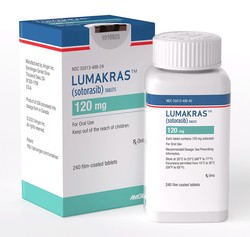Amgen has recently obtained the first-ever FDA approval for sotorasib (brand name: Lumakras), a treatment for KRAS G12-mutated non-small cell lung cancer (NSCLC).
NSCLC with KRAS mutation has remained untreated for over 40 years.
On Friday, the FDA approved the use of sotorasib, an oral KRAS G12C inhibitor, for patients with KRAS G12C-mutated locally advanced or metastatic NSCLC who have received at least one prior systemic therapy.

Earlier, the FDA designated sotorasib as an orphan drug.
Amgen sought the regulatory nod based on the objective response rate (ORR) data and duration of response (DOR) from early-stage clinical trials.
The FDA nod came three months ahead of the usual schedule, the company said.
After discovering the oncogene, KRAS, pharmaceutical companies have made ceaseless efforts to develop therapeutic agents that suppress it for the past 40 years. However, the development of anticancer drugs targeting KRAS mutation has never been successful so far, and the unmet need of patients has remained high.
In lung cancer, in particular, about 25 percent of NSCLC patients in the West have KRAS mutation, which is the second most common after EGFR mutation. The proportion of KRAS mutation is slightly lower at 10-15 percent among Asian NSCLC patients, but it is still frequently reported.
The KRAS mutation has its characteristics depending on the type and location of the mutation. KRAS G12C, the target of sotorasib, is the 12th gene mutation with glycine information among the KRAS mutations. KRAS G12C accounts for about 44 percent of KRAS mutations.
NSCLC patients with KRAS G12C mutation tend to become resistant to existing therapies. So, they show a lower survival rate even after surgery or chemotherapy compared to other types of NSCLC patients.
For example, an NSCLC patient with a normal KRAS gene with chemotherapy in the second- or third-line treatment has 16.1 months of overall survival, whereas another patient with KRAS G12C-mutated NSCLC has 6.4 months of OS.
Targeting such an unmet medical demand, sotorasib scored approval as “the first-in-class KRAS G12C inhibitor” three years after the start of clinical trials.
Data from early-stage clinical trials of sotorasib showed that the treatment showed 36 percent ORR in 124 KRAS G12C-mutated NSCLC patients who received prior therapy (chemotherapy and immunotherapy), and 58 percent of them showed at least six months of DOR.
Based on the data, the FDA gave a conditional nod for sotorasib 960mg once daily. Amgen can have continued approval through a confirmatory trial.
The FDA also asked Amgen to conduct an additional post-marketing study on 240 mg dose as a condition for granting the nod for sotorasib.
Amgen accepted the request and is likely to carry out the study.
Industry officials in Korea said the shortened approval review in the U.S. could accelerate the introduction of sotorasib in the local market.
Korea has been participating in clinical trials of sotorasib as one of the major Asian countries from the initial stage.

